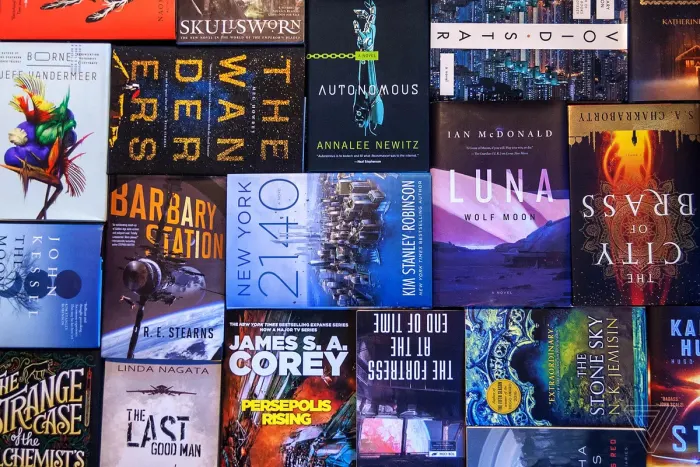“What we want is not more little books about Christianity, but more little books by Christians on other subjects – with their Christianity latent.” CS Lewis
April 23, 2022
Slice of PIE: Science Fiction and Fantasy – Evangelistic Literature of Hope and Triumph!
NOT using the Programme Guide of the 2021 World Science Fiction Convention, DisCON III, which I WOULD have been attending in person if I felt safe enough to do so in person AND it hadn’t been changed to the week before the Christmas Holidays…I WILL NOT use the Programme Guide to jump off, jump on, rail against, or shamelessly agree with the BRIEF DESCRIPTION given in the pdf copy of the Program Guide. This explanation is reserved for when I dash “off topic”, sometimes reviewing movies, sometimes reviewing books, and other times taking up the spirit of a blog an old friend of mine used to keep called THE RANTING ROOM…
No matter if you fall into the dystopian, the utopian, or the realist writer’s camp, few people will deny that at one time, science fiction was the evangelistic literature of science, and fantasy was the evangelical literature of the triumph of good over evil.
At one time, science fiction characters solved problems by the dramatic application of science. In fantasy, heroes overcame incredible odds to ultimately triumph over evil. Horror, of course, plumbed the darkest side of human nature and the supernatural, seamlessly illustrating what happened when the two collided.
Not so any more.
Horror leaks into fantasy; fantasy darts into science fiction and the genre itself has broadened to a point where the originals and their clear permutations are now sheltered under the umbrella of Speculative Fiction. (Isn’t ALL fiction speculative? Is that where we’re going?)
And yet…
And yet…
As harbingers of things to come and heralds of good and evil, science fiction and fantasy served clear purposes. The one provided visions of the future that we could mull over, reject or accept and consider implementing. The other gave us clear hope that given great sacrifice, good would triumph over evil. Even the Bible, if taken as simple literature, bears this out over and over.
Science fiction and fantasy, fondly known more briefly as SFF, bore their message both to a very specific slice of America (and sometimes beyond) and shaped technology along the way. How many of today’s scientists and inventors grew up and helped realize the vision of Roddenberry’s STAR TREK? If you watch Motorola’s “DROID” commercials, at the very end you’ll see that the name is courtesy LucasFilms, once owners of the STAR WARS franchise and is now owned by Disney (as well, the initial commercials paid homage to SUPERMAN and 2001: A SPACE ODYSSEY, too).
My thesis here – which will go undefended at this point and serve only to irritate or get people thinking – is that by scooting under the skirts of “speculative fiction”, both SF and F have lost their purpose. It is a rare instance now to read SFF and come away with a positive vision of the future or a belief that good will triumph over evil.
That’s not what “specfic” is for. Dystopian SF has flooded the YA/Teen market. Fantasy worlds hold neither good nor evil, just people of various fantastic natures muddling about, trying to do…well, usually not right, but stuff so that they don’t get killed themselves.
Instead of being messengers of future hope and the triumph of good over evil, today “specfic” merely seeks to speculate in order to entertain (or grind a particular writer’s axe...but then THAT part hasn’t changed.)
How if we hie back to request those former days – NOT the “Golden Days” of SFF which, besides being schmaltzy, were sexist, racist, and almost any other “ist” you can think of) – rather the days when SFF was the evangelistic literature of future hope and the triumph of good over evil?
Image: https://images.saymedia-content.com/.image/c_limit%2Ccs_srgb%2Cq_auto:eco%2Cw_700/MTc2MjYyNTM5OTM0NTA4MjIy/what-is-speculative-fiction.webp
 Guy Stewart is a husband; father, father-in-law, grandfather, and retired teacher/school counselor who maintains POSSIBLY IRRITATING ESSAYS offering his writing up for comment. His new novel, MARTIAN HOLIDAY will be released on December 23, 2025 and takes place in a world 500 years in the future of his first novel, EMERALD OF EARTH (YA/MS, 2024! He also writes on other worlds that have touched his life: GUYS GOTTA TALK ABOUT DIABETES, ALZHEIMERS; BREAST CANCER. He has 70+ publications in Analog, Cast of Wonders, Shoreline of Infinity, Cricket, Stupefying Stories, Nanoism, an essay in The Writer, and has created experiments for episodes of the PBS science shows Newton’s Apple, and The New Explorers—for which he became the Science Museum of Minnesota’s Teacher of the Year in 1997. Really.
Guy Stewart is a husband; father, father-in-law, grandfather, and retired teacher/school counselor who maintains POSSIBLY IRRITATING ESSAYS offering his writing up for comment. His new novel, MARTIAN HOLIDAY will be released on December 23, 2025 and takes place in a world 500 years in the future of his first novel, EMERALD OF EARTH (YA/MS, 2024! He also writes on other worlds that have touched his life: GUYS GOTTA TALK ABOUT DIABETES, ALZHEIMERS; BREAST CANCER. He has 70+ publications in Analog, Cast of Wonders, Shoreline of Infinity, Cricket, Stupefying Stories, Nanoism, an essay in The Writer, and has created experiments for episodes of the PBS science shows Newton’s Apple, and The New Explorers—for which he became the Science Museum of Minnesota’s Teacher of the Year in 1997. Really.
Subscribe to:
Post Comments (Atom)

No comments:
Post a Comment